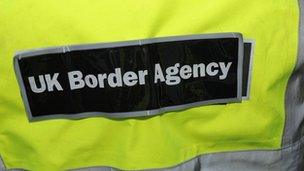Labour demand to know whereabouts of foreign criminals
- Published

The government says it will change the rules to prevent "abuse of the Human Rights Act"
Labour have demanded to know whether the Home Office can account for the "precise whereabouts" of all foreign criminals awaiting deportation.
Shadow immigration minister Chris Bryant said without that knowledge they could never be removed.
Immigration Minister Damian Green said there were 3,940 foreign offenders living in the UK, but it was "difficult to say" where every individual was.
He insisted the government was making every effort to speed up deportations.
Mr Green was summoned to the Commons to make an urgent statement on foreign criminals following reports in the Sunday Times.
The newspaper, external obtained a leaked internal UK Border Agency (UKBA) report that its says details re-offending - including murders, kidnapping and sexual offences - by foreign criminals who have served jail terms in Britain.
Offenders' whereabouts
Mr Bryant said figures from the report showed the number of foreign criminals deported had actually fallen by more than 700 this year - while the number living in the community pending removal had risen by 500 between May and September this year.
This, he said, amounted to seven foreign criminals in every UK constituency.
Mr Bryant also demanded to know whether the government was aware of the precise whereabouts of all those concerned and whether they had committed any serious crimes while awaiting removal.
"So far on your watch we have seen numbers of staff at UKBA going down, numbers of foreign national offenders deported going down and numbers of foreign criminals in our midst going up," he said.
"Don't you realise that's the wrong way round?"
Mr Green said the government was now beginning deportation proceedings against every foreign prison inmate 18 months before the end of their sentence in order to secure swift removal upon completion.
It also, he said, detained those it hoped to remove who were released before deportation could be finalised - and monitored closely in the community any who were released, so they could be eventually removed at a later date.
But he said ministers had to "operate within the law" and where courts ordered that someone be released, the government had to comply.
Of the nearly 4,000 foreign offenders in the community, 90% of them had been released by the courts - 60% on human rights grounds.
Others released were low-risk offenders "where there is no realistic prospect of removal within a reasonable period of time".
'Abuse'
As well as challenges under the Human Rights Act - including claims that a person should be allowed to stay in the UK because of dependants living here - deportation was also hindered by a lack of cooperation by offenders or their home country in getting essential travel documents, he said.
But he said the government was making other efforts to improve things, including contributing taxpayers money to build a prison in Nigeria to help speed up removals.
And Mr Green added: "We are doing everything in our power to increase the number and speed of removals.
"We are chartering flights to remove foreign offenders to many more long-haul and challenging destinations.
"We will change the immigration rules to cut abuse of the Human Rights Act."
The immigration minister faced questions from a number of MPs, including Conservative Mark Field.
He said the public would find it "rather unedifying watching this blame game" between Mr Green and Mr Bryant when what they cared about was being protected from "dangerous" foreign criminals "who should have been kicked out of this country".
Labour's Frank Dobson asked Mr Green whether instead of imprisoning foreign criminals, the UK could "save the expense" and simply deport them as soon as they were convicted.
The minister replied: "Successive Home Secretaries and ministers of immigration have grappled with that suggestion and one of the problems would be you would need to know that they would be sentenced to some kind of equivalent term in their own country.
"Otherwise you would have the terrible situation where somebody could commit a serious crime in this country in the full knowledge that the worst thing that would happen to them if they were caught and convicted would be they would be returned home free to their own country."
In October, the independent inspector of the UKBA said more than 5,000 foreign criminals awaiting deportation remained in the UK.
John Vine said the number who were not deported or could not be deported at the end of their sentence was increasing and that the majority of successful appeals against deportation were made on human rights grounds.
His report, external showed that between 2007 and 2010, 20,360 foreign national prisoners were deported from the UK - 5,235 last year alone.
- Published6 October 2011
- Published16 November 2011
- Published27 October 2011
- Published2 October 2011